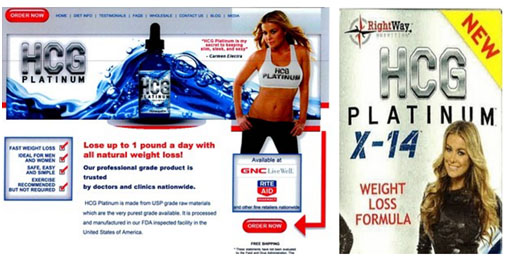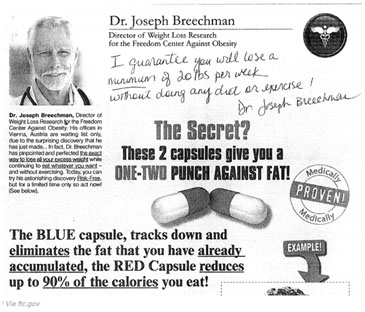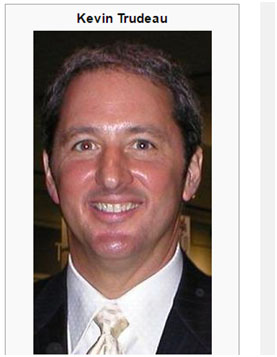Scams >> Scam And Its Types >> Weight Loss Claims
Weight Loss Claims
Nowadays more and more e-mails promising a revolutionary
pill, patch, cream, or other product that will result in weight
loss without diet or exercise. And still some products claim to
block the absorption of fat, crabs, or calories; others guarantee
permanent weight loss; still others suggest you'll lose lots of
weight at lightening speed.
Cautions:
The higher they offer the fat absorption, pill,
patch, cream, or other product the greater the risk is and sometimes
these things may cause some side effects too . So it is always better
to avoid these emails or else don't respond to these emails.
We have compiled a list of several reliable online scam fighting agencies to help you keep up to date on current and past weight-loss alert scams and its types.
Beware of offers which claim that
- Stop dieting now eat your favorites dish as you like and loose your weight.
- The catchy point in this issue will be the money back offer if you dosen't loose your weight.
- Also few of their client's photographs before and after weight loss.
Click the Video to See About Weight Loss Scams
Feel Free to use our Spam Checker Tool
We are providing you the Spam Checker Tool
for your convenience. Here your can enter the email or the contact
number that you suspect to be a scam. This tool check it with our
spam database list and ensure your regarding the email or the phone
number.
Report scam to United States government-you could file a complaint about scam or other crime here.
Report scam to United States government-you could file a complaint about scam or other crime here.
WHAT IS WEIGHT LOSS SCAM?
A New Year resolution to reduce weight? Not a bad option. You start to look for alternative ways to achieve your New Year resolution. You come across a number of options that help you reduce weight as fast as possible. But beware. There are a group of scammers who take advantage of this situation in order to make money.
Scam is the industry that has attacked almost every single niche that a person can think of. Human emotions are taken advantage of in order to fool them and sell products and services are of no use to them. Similar such a fraud scheme is the Acai berry scam in which scammers sell Acai berry products and lure the users to buy in the name of weight loss schemes. Acai berries are believed to reduce weight is what the scammers promote.
Weight loss and fat reduction products sold at high prices to customers which serve no purpose to them. Victims who are constantly looking for ways to reduce weight and fat often fall prey to such schemes. Scammers use emails, text messages and phone calls to promote fake pills, fat reduction creams, and other related products. The reality is that these products are high priced and serve no benefit to the buyer. The buyer is forced to get into monthly and yearly medication claiming that they will reduce certain kilograms of weight. The promotion is so attractive and appears to be so legitimate that the buyer believes every bit of it. There are a number of hidden costs involved in such schemes which buyer knows only after buying the product.
Most of the weight loss products sold by these scammers promote free reduction of weight without any exercise and diet.
TIPS TO AVOID WEIGHT LOSS SCAM:
- Almost all the weight loss schemes promise faster weight reduction in few days or weeks of time. Most common examples include, "reduce 5 kilograms in 15 days", and "lose 8 pounds in one week's time". The deal appears to be far realistic, but beware, if such deals really worked, no one would be fat.
- "100% Guarantee" & "Scientific breakthrough" are frequently used terms in such weight loss schemes.
- The products that are promoted by scammers in free weight loss schemes are often shown and imported and high quality products that are made attractive with exclusive tag lines.
- It is always a good option to enquire about the product and ask people about the chances of it working.
- When an attractive deal is placed in front of you, ask yourself. Is it worth? Ask people around whether the product is effective or not.
- Free weight loss products often include pills, fat reduction creams and gels. A good option is to consult a doctor before consuming the pills and using the creams.
- Never provide your social security number for a purchase. Scammers might take advantage of it.
- Read all term and conditions before purchase the product to avoid the hidden costs.
- Scammers are using specific numbers in order to lure the victims, for example "30 pounds in 30 days".
- Scammers have started to use social media platforms in order to advertise weight loss products.
Examples of free weight loss scams schemes:
1) Below is the screenshot that displays an example of free weight loss scheme promoted in social media. These advertisements add common friend names and appear as suggestion from them. Users must beware and verify with their friends regarding such free weight loss products.

2) A powder that enhances the taste and smell food and makes consumers eat less food without dieting and exercising. Sensa represents one of the bigger weight-loss product scams in recent history, with U.S. sales of more than $364 million between 2008 and 2012, according to the FTC.

3) Marketers who pitched "homeopathic HCG drops as a quick and easy way to lose substantial weight" were ordered to pay $1 million in December, and asked to stop selling HCG Platinum drops, the FTC said on Dec. 11. The products were sold online, at GNC, Rite Aid, and Walgreens and claimed users would likely lose as much as 50 pounds; a 30-day supply typically retailed for anywhere from $60 to $149.

4) Caffeine infused Inner wear that automatically reduces body fat. Norm Thompson Outfitters and Wacoal America got in trouble with the FTC earlier this year for claiming their shapewear would help consumers shed cellulite and pounds.

5) L'Occitane was required to pay $450,000 after suggesting its "Almond Beautiful Shape" cream was scientifically proven to trim 1.3 inches from a user's thighs in four weeks while significantly reducing cellulite, according to the FTC.

6) Red capsules block calories and Blue capsules burn fat
While this direct mail advertising campaign took place between 2012 and October 2013, Manon Fernet and her Quebec-based company agreed to pay $500,000 to settle FTC charges this year over their Double Shot pills.

7) Healthe Trim supplements, sold online and at CVS, GNC and Walgreens, claimed they could help customers lose up to 165 pounds with the tagline: "Get high school skinny." A month's supply cost up to $65.

Free weight loss scam cases:
Scam scheme that says "Green coffee extract can eliminate 10% of body weight". AFS claimed Green Coffee Antioxidant "caused consumers to lose 17.7 pounds, 10.5% of body weight, and 16% of body fat with or without diet and exercise, in 22 weeks," based on the flawed study. The study's lead investigator allegedly altered weights and other key measurements of subjects, changed the trial length and misstated which subjects were taking the antioxidant in the trial study.
AFS didn't play a part in getting the study on The Dr. Oz Show but issued a release highlighting the show for extra publicity afterwards, as per the FTC. The company was ordered to pay $3.5 million and "to have scientific substantiation for any future weight-loss claims it makes."
Kevin Mark Trudeau - an American author, radio personality, infomercial salesman, entrepreneur, pool player, and convicted fraudster who has promoted various health, diet and financial remedies for weight loss.

In April 2007, Trudeau released the weight loss cure. The book that he released described a weight loss plan that was previously proposed by the British in 1950's. The diet was proved to be hazardous to human health and a waste of money. The FTC has filed a contempt-of-court action against Trudeau alleging that the alleged misrepresentations in the book violate a 2004 consent order. Kevin Mark Trudeau's activities have been the subject of both criminal and civil action. He was convicted of larceny and credit card fraud in the early 1990s, and in 1998 he was sued by U.S. Federal Trade Commission (FTC) for making false or misleading claims in infomercials promoting his book The Weight-Loss Cure "They" Don't Want You to Know About.
Ripandscam.com takes initiative to spread awareness to all the web users about all the scam schemes that are adopted by scammers in order to cheat the innocent and unaware users.


